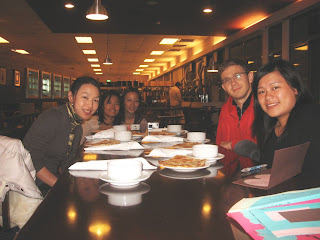Over the last seven days, I bought flight tickets to Hong Kong; went to Wufenpu ie. a crazy night market selling nothing but clothes (and stinky tofu occasionally); went ice-skating again, this time successfully; went to a Czech yogurt party; spent a lot of time in the radio lab working on a project for my Cross-Culture Communication class. I also took a Chinese TOP test, just for fun and to see where I stand with my Chinese skills. The Chinese teacher felt that I could be able to handle the intermediate level test (level 3, out of 4, with 4 being the best), so I tried. Wrong. I didn't understand anything.
Also, I had a final exam in my Chinese class, and the classes are now finished. I really learned a lot there, but will be mostly on my own from now on, except for the language exchange and the tutoring. After the exam, our class had a dinner together, and our teacher (whom I originally assessed as 18 years old :) revealed a number of shocking surprises.
Here's a picture: From left to right: The teacher; Luisa from Italy; Ivy from Canada; Myself; My Linh from Denmark.

I will post a better picture later, if I get my hands on one.
Now, for my Taiwan facts and observations part III.
- the Taiwanese night club fashion is: For girls: Super short skirts or dresses, as revealing as possible, seeing a bikini as a top is not uncommon. (but the girls still behave like teenagers, more often than not).
- Guys in clubs mostly wear the badass hiphop wide baseball caps.
- Girls also often use fake eye-lashes.
- Every once in a while, I see a girl / woman with extremely long nails on her pinkies, while all the other nails are normal. This was explained to me as "well, we really like long nails, but they are mostly really impractical. However, not a problem on the pinky." Also, one friend told me that the nails bring her good luck.
- Many Taiwanese men go find their brides to countries like Vietnam, Indonesia, Philippines, then bring them back to Taiwan and marry them. I don't know the exact reason for this - whether it's a lack of females in the Taiwanese population, or if the Taiwanese women do not want to marry the Taiwanese guys. However, people from the South-East Asian countries are somewhat looked down upon here.
- When people here get a cold, or a flu, they wear facial masks (on the street, in class), in order not to spread the disease. This seems quite practical. I guess this is at least partially caused by the serious SARS epidemic several years ago.
- Every evening, the garbage cars go around the city, playing Beethoven's Fur Elise. This is a signal for people to come out with their garbage and pass it on to the garbage men. I bet Beethoven never imagined his piece would become the garbage anthem in Taiwan.
- Every Hello! or Goodbye! here is accompanied by ferocious hands-waving.
- All the pastries in Taiwan are sweet and oily. Once, at the early stage of my stay, I was overjoyed to find something remotely similar in appearance to our bread. So I bought it, only to find out that there are raisins inside!! They also have a version with sweet red beans. Yuck.
- I have yet to see this with my own eyes, but apparently, it is quite common here to hire strippers to perform at funerals! I believe the idea is this: The more people attend a funeral, the better off the soul of the deceased will be. What's the most sure way of getting people to attend a funeral? Promise them a strip show. Twisted, but effective.

















